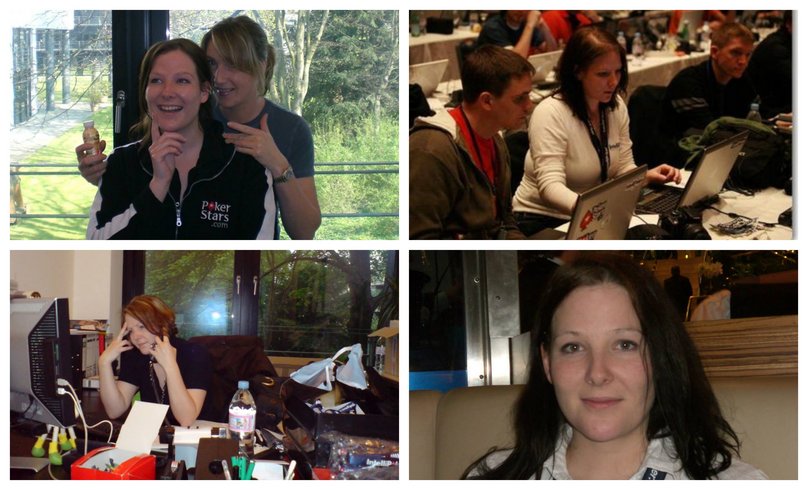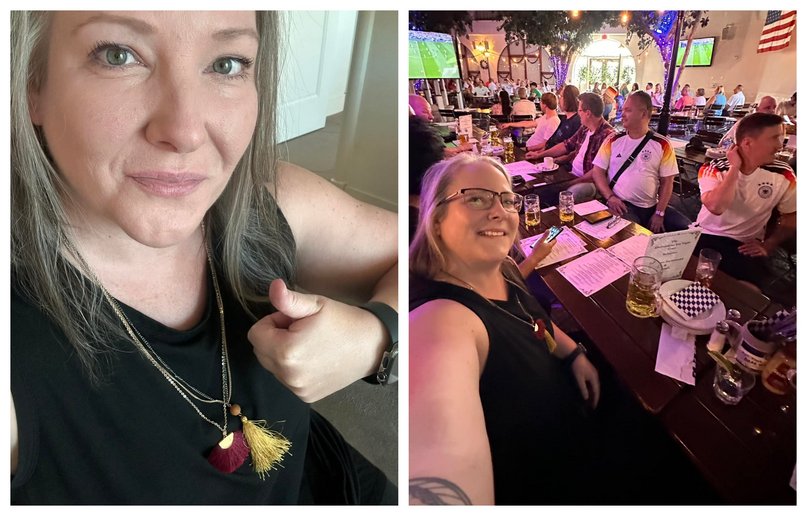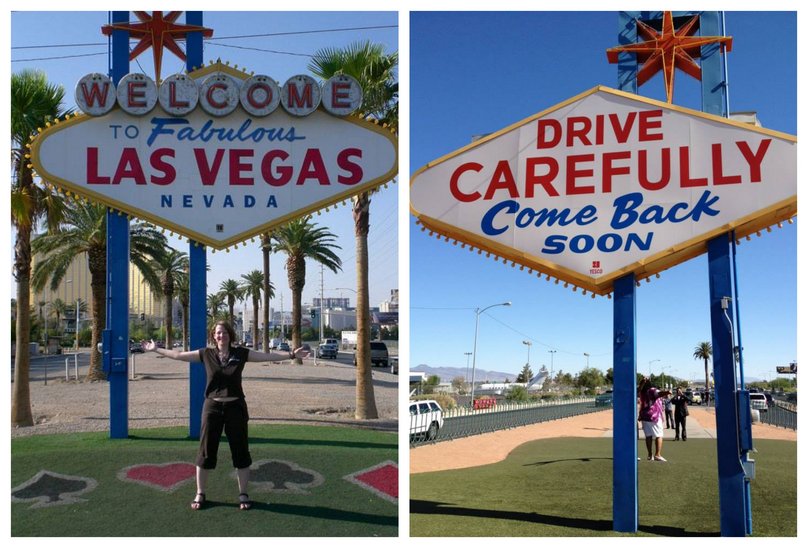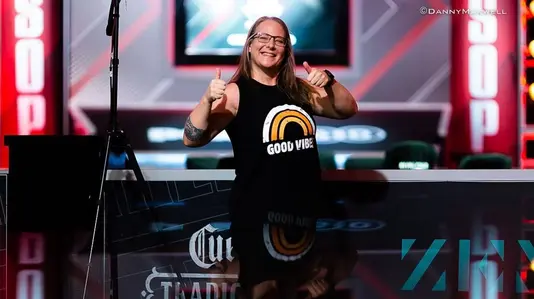In this interview, she will tell you more about her life journey and how to survive seven weeks in Las Vegas on minimal costs. The conversation also covers the record $500 million WSOP brand sale! Our Mila Monroe spoke with Christin Maschmann in a video interview. Here's a transcript of the interview for those of you who haven't seen or heard the interview.
How did your path into the poker industry start?
"Well, I started playing poker in 2007, when I was with friends in New York and we played poker together and I immediately thought I wanted to work in the industry. Well, I didn't think I wanted to be a professional poker player, I wanted to work in the industry. And then I lived in Dublin in 2007 and that's when I started playing live poker. And then I became more and more interested in what it means to work online. I started applying for jobs at Full Tilt, because they were in Dublin, and at PokerStars on the Isle of Man. It didn't really work out, but at the EPT in Dublin in 2008, I managed to meet Katja Tata from back then, who was a PokerStars Pro. And I said I'd like to work for PokerStars.

She said, ah, it's all a bit difficult and all that. Then at some point I found out that an EPT was coming to Dortmund. And I said... Is there anything I can do to help out? Is there anything I can do? Because I knew Daniel Negreanu was coming, I really wanted to get to know him. And then I thought, can I do anything to help? And then they said, yes, I can help with the Intellipoker stand. And then I just thought I'd hand out flyers or something. What I didn't know was that when I arrived, they said, no, you're going to go in front of the camera and interview people. And I wasn't prepared for that at all, because I only knew Daniel Negreanu and that was super embarrassing. But the good thing is that I did an interview with Daniel and it was perfect because Daniel is super easy to interview. He knows exactly what to say and everything. And then I got an offer to work for IntelliPoker in Hamburg. It was a subsidiary of PokerStars and I really put a lot of effort into it. I worked very hard because I always knew I wanted to go straight to PokerStars on the Isle of Man. And that worked out in 2010. "So I've basically been in the industry since 2008."
There was this big poker boom in 2003. You didn't have much to do with poker back then, or were you already a bit involved?
"I didn't have anything then. I only really came into contact with it in 2006, when I was in New York with my friends. But, of course, they were fully aware of this boom. In other words, they were really into it. And I also remember when I was there, there were always WSOP commercials on TV. Even Katja was in a commercial, which was completely paradoxical. So yes, exactly, but I didn't notice anything about the boom. Poker was still in the middle of the boom, I would say, when I started."
And this boom went on for a long time, from 2003 to 2007, because I used to say that I got into poker when this typical boom was happening. So by boom we mean this story with Moneymaker when he won the WSOP. And I always thought that was 2007 or something. But it was 2003 and it lasted so long.
"So you could say the boom even lasted until 2011 when Black Friday happened. Which just brought everything to a halt. So I think it really was, it just went up, up, up, up, up, then Black Friday came and then there was the crash. And then yes, the boom actually lasted until 2011."
And it is April 15, 2011, Black Friday. Maybe tell us all a bit more about the term and also tell us where you were at the time and what you noticed.
"Yes, that's the crazy thing. It's like a lot of people who know where they were on September 11th. I know exactly where I was on Black Friday because it was Saturday morning in our house. So I woke up Saturday morning, I was in my apartment and there was something going on again that day, a typical event with all the PokerStars employees. It was someone's birthday, we had rented a bus and were going to drive around the island and have a drink everywhere. That was then immediately canceled. I got a call from my boss straight away in the morning. Have you seen the news? And then he explained to me that practically the... The Ministry of the Interior, the FBI, had completely shut down the poker sites PokerStars, Full Tilt, Ultimate Bett and Absolut Poker, and had practically taken over the URLs. In other words, when someone logged on to one of these sites, the FBI logo came up and said, "This site has been taken down. You no longer have access. So, of course, that was the message for us. We didn't know what was going on, what that meant. And of course everyone thought, okay, are we going to lose our jobs now? Which was really scary. The US market is simply the biggest market, the most important market. And suddenly it was gone. And most people went to the office and said, is there anything we can do? But what do you want to do? So we were there, ready to help, whatever we could. You couldn't really do anything in that sense. The only thing that happened really quickly, which was damn good, was that Isai Scheinberg said directly to everyone that nobody would lose their job. He made that crystal clear and he stuck to it. Nobody lost their job over Black Friday. Except, perhaps, him and the rest of the top management. The stories are well known. They broke the rules in the USA. Unfortunately, there's nothing you can do about it. And that's why they all ended up facing lawsuits. It was clear that if Isai left the island, he would be arrested by Interpol. And that's what he did a few years ago, he simply left, flew to New York, got himself arrested there, let the whole issue pass and is now a free man. But at the time, we knew nothing. We practically lost most of our business."

What happened next?
"So Full Tilt - they just took the players' money and blew it until it was gone. And then when the players wanted to play, there was no more money. And it was all a process until it all came out. And then it was practically clear that the players had lost their money. It was 150 million dollars that was simply gone. So roughly, I don't think I know exactly. And yes, then PokerStars came along and said, we'll do the Robin Hood here and pay out all the Full Tilt players. So we'll buy Full Tilt and pay out all the Full Tilt players to practically make the poker world whole again, so that the players have money to play again. So that the whole economy gets going again. Great idea, great action from Isai back then. I was so proud. It was simply insane what he decided to do. And so Full Tilt practically became part of PokerStars and the Stars Group. And then a few years later, I moved from the Isle of Man to Dublin and worked in the old Full Tilt office, which was really exciting because, as I said, I was able to talk to people who were there and they said, oh, when they started taking away our coffee machine, we knew we had a problem. I thought that must have been bad at the time. And Ray Bitar's former office is now a break room with the pool table and stuff like that. And I often stood there in the morning and thought, man, if these walls could talk, what kind of crap happened here, that was really exciting. Exactly, yes, that's how I found out about it from the PokerStars site, practically from the good side, and then only heard about the bad side, the bad guys, the whole story later."
How difficult is it to assert yourself as a woman in this industry over the years? Hand on heart.
"It's difficult because the whole industry is simply dominated by men, the game. As I said, we know it's 95 percent men at the tables. Away from the poker table, I would say we have 12 to 15 percent women, so behind the scenes in terms of work. But it's still just not a lot. At Intellipoker, Katja and I were the two women. He was later joined by an assistant, who I had, but that was it, so there weren't many women either. When I joined PokerStars, the women worked in the HR department, maybe in marketing and so on, but with poker itself, so it was all men. And I tried to apply several times to work in the poker room. And in my opinion, I would have been good for some of the roles I applied for. And the head of the poker room at the time said to me, yes, unfortunately it didn't work out this time. And then I said, yes, maybe I was aiming too high and he said, no, but maybe I was in the wrong tree. So it was practically made clear to me between the lines, stay away from poker. So it was moments like that that contributed more and more to the frustration that at some point I didn't want to work at PokerStars anymore. That was one of the reasons, because I worked really, really hard, tried hard to reach a position that would make a difference. So when I was at poker school, I didn't do that much. Later I worked in innovation. That's when I thought, man, that's it. I can make a difference there. But PokerStars really is the least innovative poker company you can imagine. So of all the things we did there, everything we did there, it was all for nothing. It was very, very frustrating. And that was another reason why I wanted to leave."

So what is your position at GGPoker and how did you get there?
"I'll give you a quick rundown. When I left Stars back then, I started my own business and worked for all sorts of different poker companies. I trained as a media designer for image and sound. So I had the idea of setting up a media agency for poker, where I would do video production, social media management and article writing, translations, all sorts of things. And I've mixed it up quite well. And I did a bit for GGPoker, a bit more for GGPoker, a bit more. Then at some point I was a consultant for the German market. And ... the story is just awesome: I offered the CEO of GGPoker that we could meet up if he had any questions. I had been with PokerStars for 11 years and my thoughts on the German market and so on. And then he actually gave me a whole hour of his time. And we talked about all sorts of things. At the end he says, where do you live anyway? And I said: nowhere, I'm a nomad. I live nowhere and everywhere. Then he says, you should have a job for that. I'm like, okay. And then three weeks later. he took me aside again and said, here, I want you to do quality control at live events. And that became my main job at GGPoker. Back then, it was mainly GGPoker-sponsored events. For example, there was the KSOP in Brazil. There were some WSOP Circuit events. That was Dublin Poker Festival and things like that, WSOP Europe and so on. So various things where GGPoker was involved as a sponsor. GG and WSOP have always been a bit linked over the last few years. And then earlier this year, I just heard from someone in the back, there was probably a meeting where the CEO of GG, Michael Kim, said to Gregory from the WSOP, hey, do you actually have someone who does quality control at Circuit events? And Gregory was like, no. And then he says, here, I've got Christin for you. Zack. And then I was pushed over to the WSOP and have been doing quality control at WSOP Circuit events since March, so only international ones, not the ones in the USA. I've been to Brazil, Toronto, Montreal, Venlo and now I've also been to Tallinn. And I just go there, go for four days and just practically, yes, talk to everyone as best I can and then everything is checked. So it's about how comfortable is it for the players? How warm, how cold is it? Are the chairs comfortable? How good are the dealers, cards, chips? What are the food options? What is around the hotel or around the casino? What are the hotel options? How expensive is it? And then everything goes into one big report and it's sent directly to Gregory at the WSOP. That's the practical part, my main job right now."
So you've traveled to 53 countries around the world and been to many poker hotspots. In your opinion, which is the most beautiful apart from Vegas?
"Yes, I was just about to say, that's just Vegas. So when it comes to poker, it's just Vegas. There is simply nothing better than Vegas. It's unbeatable. But I think the second thing I have to say is that it has changed. But it's actually Ireland as a country completely, because that's where I learned poker. That's where I started playing poker. The poker room where I started, Fitzwilliams, unfortunately no longer exists. Unfortunately, it went down the drain due to mismanagement. That makes me very, very sad, because it was an iconic poker room in Dublin. A lot of people started playing there. And the atmosphere in Ireland when you play poker is just awesome. People have fun and enjoy themselves and are inclusive. For example, I once played in a tournament in Killarney and then someone said to me, where are you from? From Germany, but I live here now. And he said yes, then you're Irish now. It's just like that. The Irish are just so sweet."

Okay, very quickly, your three tops and your three flops as far as Vegas is concerned this year.
"So now it's about my flops and tops. So the three tops were definitely that I managed to practically get paid to be in Vegas for two months. Then, relatively late in the trip, I decided to do a small tournament package because I didn't really want to play that much. I then made a small package with five tournaments and cashed in three of them. So I was happy with that too. So nothing big, no huge winnings. And the third thing that was great for me was that I managed to relax. And it sounds strange, but I traveled too much and too fast in the first five months of the year. I was in twelve countries in five months and I was completely exhausted. Yes, and I needed Vegas to relax, which is a complete paradox. But because I knew I'd be there for two months, I'd have practically free accommodation, I'd get money for food, I just said I needed this time to come down. And I have to be honest, I'm proud of myself that I managed it. I relaxed really well, I was at the pool a lot and of course played less poker as a result. And that's also one of the three flops. I didn't play enough poker. Actually, I only really play a lot of poker when I'm in Vegas. It's just straight cash games, ABC Poker. you can earn money. And the times I've played, I've actually won every time. I really would have liked to play more, but I just needed the peace and quiet. Another flop was that I didn't meet that many friends, because practically the entire poker industry is in Vegas during the WSOP. That means there are hundreds of people I know in one place. And you're always like, hey, let's go out for a meal. Yes, yes, yes. And then it just never happens. And this time it was even less than usual. So I really hardly did anything with friends. And I binged a bit too much. But that was a bit of a problem, that I had to collect these points to get onto Pearl at MGM so that I could get free hotels again next year. But unfortunately that didn't work out as well as it could have. Exactly, that was a flop."
And today, and this is on everyone's mind, we learned something. GGPoker has bought the WSOP brand for 500 million. What do you think? Was that news to you?
"Nah, let's put it this way, it wasn't a surprise to me at all. It's practically been going on for three years now. The problem is that Nevada has the toughest gambling commission in the USA. This means that it has simply taken forever due to the various permits and authorities and everything. And it really dragged on for three years until the cork finally popped yesterday. And the issue is finally over and done with, because it really, really took a long time. Every summer you thought it was going to be announced, and then it wasn't and then it wasn't. And exactly, it was just awesome that it was finally announced, because what GGPoker can do now with the WSOP is just terrific. There was this interview with Isai Scheinberg from PokerStars after he had clarified everything with his legal situation. And he said that the thing he regrets most is that he didn't buy the WSOP. He wanted to buy the WSOP back then. And what PokerStars would have done with the WSOP back then was what GGPoker is hopefully doing now. Simply taking this product, this brand, to completely new levels. It's an old company. The WSOP doesn't exist in this constellation, but the product has been around for 55 years. And the company is just a bit worn out. But we do the same thing every year. It works. As long as we break our records here and there, it's all good. They only have a handful of employees, which is completely crazy for a company like this and it's easy to imagine what it could become. Now with GGPoker in the game is simply unbelievable. It will be like that, it was also announced a little bit that it will be expanded even further globally. The WSOP brand, which is also the WORLD Series of Poker. That's how it should actually be. Which is of course good news for me, because it will probably mean that I will be sent to many of these events, which is great. And at the same time, there's also the WSOP Plus app, for example, where GGPoker was and is very involved. If all these things come together now, the WSOP will simply become more modernized. I know that Michael Kim absolutely hates queues, when people have to wait in lines. And that was super extreme again this year at the WSOP. That will be one of the biggest goals, to automate and modernize everything and then expand worldwide. Which I don't think the WSOP would ever have done without the help of an online provider. It will be exciting to see what is announced in the coming weeks and months. And of course it could open the doors for GGPoker in the US. Who knows."

What do you think, is there a poker boom 2.0?
"Yes, if you look at it that way, then we're having one right now. Just as I defined earlier what the Money Maker boom was, it actually lasted from 2003 to 2011. A boom is actually something that goes up and then crashes again. Boom. And that was actually the case, it went up, up, up, up, up and then it crashed due to Black Friday. And now we're back to the same thing. We've reached the point again where it's going up, up, up, up. We're breaking records all over the world. And now there's just hope. Can something like Black Friday still happen or will it just go on and on? And then you can't really speak of a boom in that sense, but simply a steady growth of the poker industry. And that is actually much safer and much more desirable than a boom that has an end."
That's true. You said it very well. What do you wish for the poker industry?
"Yes, well, we're on the same level. Let's imagine we had as many women in poker as men. That would be 100 percent more players. That's something that would of course be very desirable for the entire industry worldwide. That's simply the most important thing. And there was a time when I said we simply wouldn't get the women. But now I have a few thoughts on this, because it's just... practically about behavior at the poker table. I was at the TDA Summit where all the tournament directors were talking about this situation. Katie Stone was there and talked about it. It's not just about improving behavior at the poker table worldwide so that women dare to play, but simply so that new players don't have this hurdle that there is bad behavior and so on. And that's something I very much want us to work on. I have another example, when I was playing at the Orleans in Vegas, there was a cup on the floor with a bit of drink in it and a new player came in. I'm like, oh, careful, there's a cup. And he just kicks it under the table and sits down. And I've also seen players blow their nose and throw their handkerchief under the poker table before. For some reason, there's this idea that you can just behave like a pig at the poker table. And that's something that I really, really wish would improve, that we simply become tougher in punishing such behavior immediately, so that people who are new to the game don't feel so put off right away. These are beginners, but also women, of course. So it's not just aimed at women."



